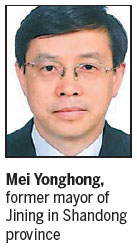'Poorly paid' mayor resigns office
Updated: 2015-09-08 08:37
By Zhang Yan(China Daily)
|
|||||||||
The mayor of Jining in East China's Shandong province has resigned and gone into business, authorities in the province said.
Mei Yonghong's resignation was approved by the Jining People's Congress on Sunday, making him the second bureau-level official to quit office in Shandong since June.
Zhang Shuhua, former deputy mayor of Heze, Shandong, resigned and joined the Shenzhen branch of China Pacific Insurance to serve as the secretary of its Party committee in June.
According to one senior Jining government official who declined to reveal his name, Mei will serve as an executive in Shenzhen Huada Gene Technology. China Daily was unable to contact Mei for a comment.
From 2010 to 2015, Mei was the deputy party secretary and mayor in Jining. His last public official activity was on Sept 1, when he attended the Jining cultural center opening ceremony at Taibai Lake. Since then, he has not been seen in public.
Mei said in an interview in March that civil servants in China get a very low wage. His monthly income was about 7,000 yuan ($1,100), and county-level officers could earn as little as 3,000 yuan, far less than migrant workers in factories.

"I have to work more than 10 hours a day and have hardly any weekends or holidays, but get so little salary," he told the Southern Metropolis Daily.
Since the new leadership was elected in November 2012, the country has conducted a drive to fight against corruption. More than 100 officials at ministerial and provincial level or above have been investigated for alleged graft issues.
Meanwhile, lots of government officials, including many at bureau level, have quit due to the authorities' tightened supervision on their administrative powers and the pressure the anti-corruption campaign has put on them.
Taking Hunan province as an example, since 2012 more than 15 civil servants above county level have resigned, half of whom had invested in businesses.
The involved officials quit mainly because of low wages or difficulties in running their offices.
Tang Zhijun, professor of economics at Hunan University of Science and Technology, said that on one hand, some officers leaving to go into business will reduce costs, which will enable the government to "invest more money in people's livelihoods, improve working efficiency, then win more trust from the public".
On the other hand, it's more than necessary to "improve the relevant mechanism to supervise the officers' powers and motivate them to perform to the best of their abilities to serve the public", he added.
zhangyan@chinadaily.com.cn
(China Daily 09/08/2015 page3)

 Aerial view of Yamzho Yumco Lake in Tibet
Aerial view of Yamzho Yumco Lake in Tibet
 Chinese 'blade runners' fight for sports dreams
Chinese 'blade runners' fight for sports dreams
 The world in photos: Aug 31 - Sept 6
The world in photos: Aug 31 - Sept 6
 Breath of fresh air for a 'living fossil'
Breath of fresh air for a 'living fossil'
 Learn to behave like a real noble
Learn to behave like a real noble
 50th anniversary of Tibet autonomous region
50th anniversary of Tibet autonomous region
 Red carpet looks at the 72nd Venice Film Festival
Red carpet looks at the 72nd Venice Film Festival
 China beats Russia in 4 sets at volleyball World Cup
China beats Russia in 4 sets at volleyball World Cup
Most Viewed
Editor's Picks

|

|

|

|

|

|
Today's Top News
Sarah Palin: Immigrants should 'speak American'
Germany frees up funds for refugees, speeds up asylum procedures
China 2014 GDP growth revised down to 7.3%
White paper on Tibet reaffirms living Buddha policy
China to introduce circuit-breaker for stock market
Austria, Germany open borders to migrants
Central government steps up economic support for Tibet
China economy enters 'new normal' eyeing 7% growth rate: G20
US Weekly

|

|








